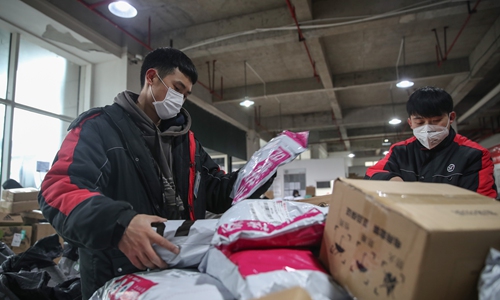HOME >> SOURCE
China's express-delivery sector to become capital and technology intensive: Fitch
Source:Xinhua Published: 2020/3/7 17:12:58

Two SF Express employees sort packages in an SF warehouse in Guiyang, Southwest China’s Guizhou Province, on February 8. Photo: cnsphotos
China's express-delivery sector will transition from a labor-intensive industry to a capital-and-technology intensive one, as key participants cut unit costs and improve efficiency through scale expansion and technological advancement, said Fitch Ratings in a recent report.
Industry concentration will continue to rise as larger companies that have a competitive edge gain market share as well as through mergers and acquisitions, strategic alliances and the exit of smaller participants, according to the report.
China's express-delivery market has been the world's largest by volume since 2014 and is likely to become the largest by revenue in 2020, underpinned by the country's shift to a consumption-driven economy, continuing urbanization, rising e-tailing penetration into inland and lower-tier regions as well as the rise of new retail models and social e-tailing, the ratings agency predicted.
The recent coronavirus outbreak highlights the sector's important role in delivering medical supplies and living necessities, which led to the government to speedily roll out supportive policies, including tax deductions for express-delivery companies, the report noted.
"We believe the epidemic will have a long-lasting impact on Chinese consumer behavior, which will accelerate the shift toward online shopping channels and new retail that sends goods via on-demand delivery," said the report.
China saw about 63 billion express parcels handled in 2019, up 24 percent year on year. Business revenue expanded 23 percent to stand at about 745 billion yuan (107.5 billion US dollars), according to data from the State Post Bureau.
Posted in: INDUSTRIES,BIZ FOCUS